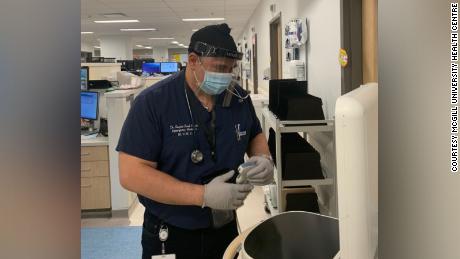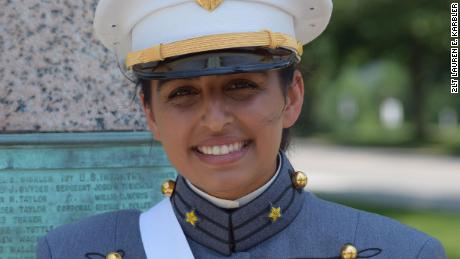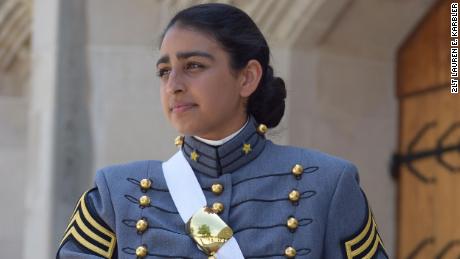Second Lieutenant Anmol Narang, a second-generation immigrant born and raised in Roswell, Georgia, is the academy's first observant Sikh, meaning she follows religious practices including Kesh, which calls for allowing one's hair to grow naturally without cutting it."It's an incredible feeling," Narang told CNN. "It's a humbling experience, I have never worked harder for anything in my life. Being a Sikh woman is a very important part of my identity and if my experience can play a small role in being an inspiration for others, regardless of career field, that will be wonderful." While other Sikhs have graduated from the academy, the Sikh Coalition has confirmed to CNN that Narang is the first observant Sikh to have graduated from West Point.The 23-year-old graduate hopes that her efforts to represent her religion and community will encourage Americans to learn more about the Sikh faith, the fifth largest religion in the world.Narang said she decided to apply to West Point to study nuclear engineering and pursue a career path in air defense systems after visiting the Pearl Harbor National Memorial in Honolulu, Hawaii.Her graduation marks an incredible success for Sikh Americans. In 1987, Congress passed a law prohibiting various religious communities, including Sikhs, from practicing certain articles of their faith while serving in the military.For 30 years, Sikh members of the military were not allowed to practice core tenets of their face, including unshaven hair and turbans.In 2017, eight years after the Sikh Coalition began its campaign to end the US military's ban on certain religious practices restricting Sikh members, the Army updated its rules governing religious liberties."I am immensely proud of (Second Lieutenant) Narang for seeing her goal through and, in doing so, breaking a barrier for any Sikh American who wishes to serve," said US Army Captain Simratpal Singh in a statement. "The broader acceptance of Sikh service members among all of the service branches, as well as in top tier leadership spaces like West Point, will continue to benefit not just the rights of religious minority individuals, but the strength and diversity of the US military."
While other Sikhs have graduated from the academy, the Sikh Coalition has confirmed to CNN that Narang is the first observant Sikh to have graduated from West Point.The 23-year-old graduate hopes that her efforts to represent her religion and community will encourage Americans to learn more about the Sikh faith, the fifth largest religion in the world.Narang said she decided to apply to West Point to study nuclear engineering and pursue a career path in air defense systems after visiting the Pearl Harbor National Memorial in Honolulu, Hawaii.Her graduation marks an incredible success for Sikh Americans. In 1987, Congress passed a law prohibiting various religious communities, including Sikhs, from practicing certain articles of their faith while serving in the military.For 30 years, Sikh members of the military were not allowed to practice core tenets of their face, including unshaven hair and turbans.In 2017, eight years after the Sikh Coalition began its campaign to end the US military's ban on certain religious practices restricting Sikh members, the Army updated its rules governing religious liberties."I am immensely proud of (Second Lieutenant) Narang for seeing her goal through and, in doing so, breaking a barrier for any Sikh American who wishes to serve," said US Army Captain Simratpal Singh in a statement. "The broader acceptance of Sikh service members among all of the service branches, as well as in top tier leadership spaces like West Point, will continue to benefit not just the rights of religious minority individuals, but the strength and diversity of the US military." President Donald Trump on Saturday Read More – Source
President Donald Trump on Saturday Read More – Source
Second Lieutenant Anmol Narang, a second-generation immigrant born and raised in Roswell, Georgia, is the academy's first observant Sikh, meaning she follows religious practices including Kesh, which calls for allowing one's hair to grow naturally without cutting it."It's an incredible feeling," Narang told CNN. "It's a humbling experience, I have never worked harder for anything in my life. Being a Sikh woman is a very important part of my identity and if my experience can play a small role in being an inspiration for others, regardless of career field, that will be wonderful." While other Sikhs have graduated from the academy, the Sikh Coalition has confirmed to CNN that Narang is the first observant Sikh to have graduated from West Point.The 23-year-old graduate hopes that her efforts to represent her religion and community will encourage Americans to learn more about the Sikh faith, the fifth largest religion in the world.Narang said she decided to apply to West Point to study nuclear engineering and pursue a career path in air defense systems after visiting the Pearl Harbor National Memorial in Honolulu, Hawaii.Her graduation marks an incredible success for Sikh Americans. In 1987, Congress passed a law prohibiting various religious communities, including Sikhs, from practicing certain articles of their faith while serving in the military.For 30 years, Sikh members of the military were not allowed to practice core tenets of their face, including unshaven hair and turbans.In 2017, eight years after the Sikh Coalition began its campaign to end the US military's ban on certain religious practices restricting Sikh members, the Army updated its rules governing religious liberties."I am immensely proud of (Second Lieutenant) Narang for seeing her goal through and, in doing so, breaking a barrier for any Sikh American who wishes to serve," said US Army Captain Simratpal Singh in a statement. "The broader acceptance of Sikh service members among all of the service branches, as well as in top tier leadership spaces like West Point, will continue to benefit not just the rights of religious minority individuals, but the strength and diversity of the US military."
While other Sikhs have graduated from the academy, the Sikh Coalition has confirmed to CNN that Narang is the first observant Sikh to have graduated from West Point.The 23-year-old graduate hopes that her efforts to represent her religion and community will encourage Americans to learn more about the Sikh faith, the fifth largest religion in the world.Narang said she decided to apply to West Point to study nuclear engineering and pursue a career path in air defense systems after visiting the Pearl Harbor National Memorial in Honolulu, Hawaii.Her graduation marks an incredible success for Sikh Americans. In 1987, Congress passed a law prohibiting various religious communities, including Sikhs, from practicing certain articles of their faith while serving in the military.For 30 years, Sikh members of the military were not allowed to practice core tenets of their face, including unshaven hair and turbans.In 2017, eight years after the Sikh Coalition began its campaign to end the US military's ban on certain religious practices restricting Sikh members, the Army updated its rules governing religious liberties."I am immensely proud of (Second Lieutenant) Narang for seeing her goal through and, in doing so, breaking a barrier for any Sikh American who wishes to serve," said US Army Captain Simratpal Singh in a statement. "The broader acceptance of Sikh service members among all of the service branches, as well as in top tier leadership spaces like West Point, will continue to benefit not just the rights of religious minority individuals, but the strength and diversity of the US military." President Donald Trump on Saturday Read More – Source
President Donald Trump on Saturday Read More – Source











